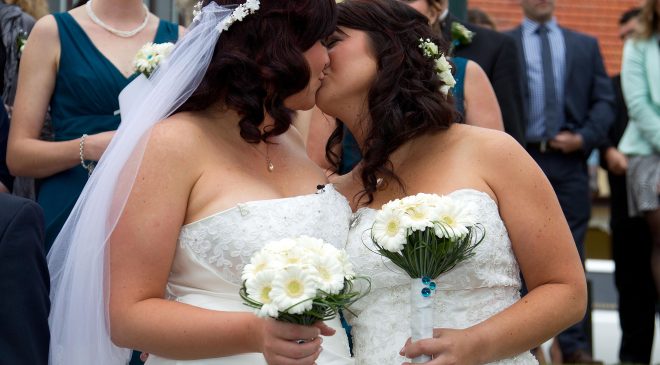The sound of the US Supreme Court’s June ruling in Dobbs v. Jackson Women’s Health Organization, overturning half a century of abortion jurisprudence under Roe v. Wade, is the sound of multiple cans of worms popping open, particularly in light of associate justice Clarence Thomas’s concurrence, which calls for the court to “correct the error” of “substantive due process” by overturning other previous court decisions based on it.
Potentially on that chopping block: Obergefell v. Hodges, in which the court held that both “substantive due process” and “equal protection” require all states to recognize same-sex marriage.
Rather than eat the worms in question, the US House of Representatives resurrected and passed (with significant Republican support) something called the “Respect for Marriage Act.”
The act, which may or may not survive Senate politics, hangs its hat on a third constitutional justification unmentioned in Obergefell: The “full faith and credit” clause.
“Full Faith and Credit,” Article IV, Section 1 of the US Constitution commands, “shall be given in each State to the public Acts, Records, and judicial Proceedings of every other State. And the Congress may by general Laws prescribe the Manner in which such Acts, Records and Proceedings shall be proved, and the Effect thereof.”
The Respect for Marriage Act “prescribes … the Effect thereof” by requiring states to recognize marriages licensed in other states without discrimination on the basis of “the sex, race, ethnicity, or national origin” of the married individuals.
In plain English: If you get legally married in Massachusetts, then go to Mississippi, you’re still legally married in Mississippi even if Mississippi’s government doesn’t like it.
That makes sense, at least within the context of “marriage” as a state-sanctioned privilege requiring a “license.” It’s clearly constitutional, and its likely effect is to protect rights.
But why are state governments regulating and licensing marriage in the first place?
We know why they started doing so in the 19th century: To stop white folk from marrying black folk. That wasn’t a good reason then and wouldn’t be a good reason now even if the court hadn’t ruled it unconstitutional in Loving v. Virginia.
Instead of hoping the federal government will protect our rights from state governments in the issuance of “licenses,” we’d all be better off with government out of marriage entirely.
Yes, entirely. No licensing. No social engineering with tax privileges or penalties. No conditioning of hospital visitation rights on possession of a “license.”
There are two widely held views of marriage.
One is that it’s a religious sacrament, the contents and obligations of which vary from religion to religion.
The other is that it’s a contractual commitment/obligation, and there’s no compelling reason why the content of such a contract shouldn’t vary from marriage to marriage.
In neither case should government, at any level, be in the business of prescribing the content or requiring a license for the practice.
The Respect for Marriage Act may be a good start, but marriage freedom for couples — and non-couple groups — is the finish line.




